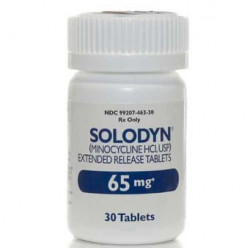Solodyn (minocycline) Coupons, Discounts & Cost
Solodyn (minocycline) is a drug that belongs to the group of broad-spectrum antibiotics called tetracyclines. One way to save money on the Solodyn retail cost regardless of income and insurance status is to use Solodyn coupons or discount cards from RXCoupons. Use this Minocycline coupon at this online pharmacy and receive up to 75% off the sale price.
Solodyn – what is it?
Solodyn (minocycline) is a drug that belongs to the group of broad-spectrum antibiotics called tetracyclines. Thanks to its bacteriostatic properties, minocycline is used for infectious diseases caused by sensitive flora: pneumonia, bronchitis, pleural empyema, cholecystitis, angina, pyelonephritis, intestinal infections, endocarditis, prostatitis, syphilis, gonorrhea, brucellosis, osteomyelitis, etc. This drug is sometimes used to prevent postoperative complications. Solodyn is also used in combination therapy for leprosy, nocardiosis, acne. This drug is prescribed in combination with other drugs in the case of severe and very severe forms of acne. Minocycline is also indicated to eradicate meningococci from the nasopharynx.
Solodyn contraindications: hypersensitivity, severe hepatic insufficiency, leukopenia, children under 12 years of age.
Use with caution: dysfunction of the liver, hypersensitivity.
Solodyn is contraindicated during pregnancy and lactation.
Solodyn doses
Solodyn is usually used once a day (with large amounts of liquid). It is recommended to drink plenty of liquid to reduce the risk of irritation and ulceration in the esophagus.
The highest single dose: 100 mg.
The highest daily dose: 200 mg.
The daily dose of the drug should be determined by a doctor. The average daily dose of minocycline for an adult is 100-200 mg. As for children older than 8 years of age, the dose is 4 mg/kg, then 2 mg/kg every 12 hours. It is recommended not to exceed the maximum daily dose of Solodyn.
As for acne, the usual dose is 50 mg per day. The duration of the treatment course is 1.5-3 months. Patients with renal insufficiency should monitor the level of creatinine and urea in the blood (in order to prevent acidosis, hyperphosphataemia and azotemia). The daily dose of the drug should not exceed 200 mg under such circumstances.
Solodyn: different types of side effects
Possible side effects: vestibular disorders (dizziness), skin and mucous membrane pigmentation, hepatotoxic effect, nausea, vomiting, candidiasis.
Central and peripheral nervous system: headache, dizziness, increased intracranial pressure.
Digestive system: dyspeptic disorders, anorexia, abdominal pain, diarrhea.
Hematopoietic system: hemolytic anemia, thrombocytopenia, neutropenia, eosinophilia.
Dermatological reactions: extreme sensitivity to ultraviolet, skin itching, other allergic reactions.
Solodyn contraindications
The drug is contraindicated in patients with hepatic impairment. It is not used in children up to 8 years of age. Do not use Solodyn if you are allergic to tetracyclines.
Solodyn interactions
Solodyn reduces the effectiveness of certain bactericidal antibiotics (penicillins, cephalosporins).
Antacids and iron preparations may reduce the absorption of the drug.
The concentration of the drug increases when using Solodyn with chymotrypsin.
Solodyn: special instructions
It is recommended to limit insolation during Solodyn therapy. During treatment, it is recommended to take vitamins B and K in order to prevent hypovitaminosis.
Solodyn should not be mixed with any type of alcohol. As for hepatic or renal failure, the drug should be used in small doses (in conjunction with hepatotoxic medicines).
The most characteristic symptoms of Solodyn overdose are vomiting and dizziness. It is advisable to stop taking medication when dangerous symptoms of an overdose appear.
The absorption of minocycline is lower when you take the drug with milk and dairy products.
Minocycline may cause discoloration of the teeth, enamel hypoplasia and skeletal dysplasia. Therefore, minocycline is not used in children under 8 years old.
Storage conditions
Solodyn is stored in a dry, darkened place, inaccessible for children. The temperature should not exceed 25° C.

